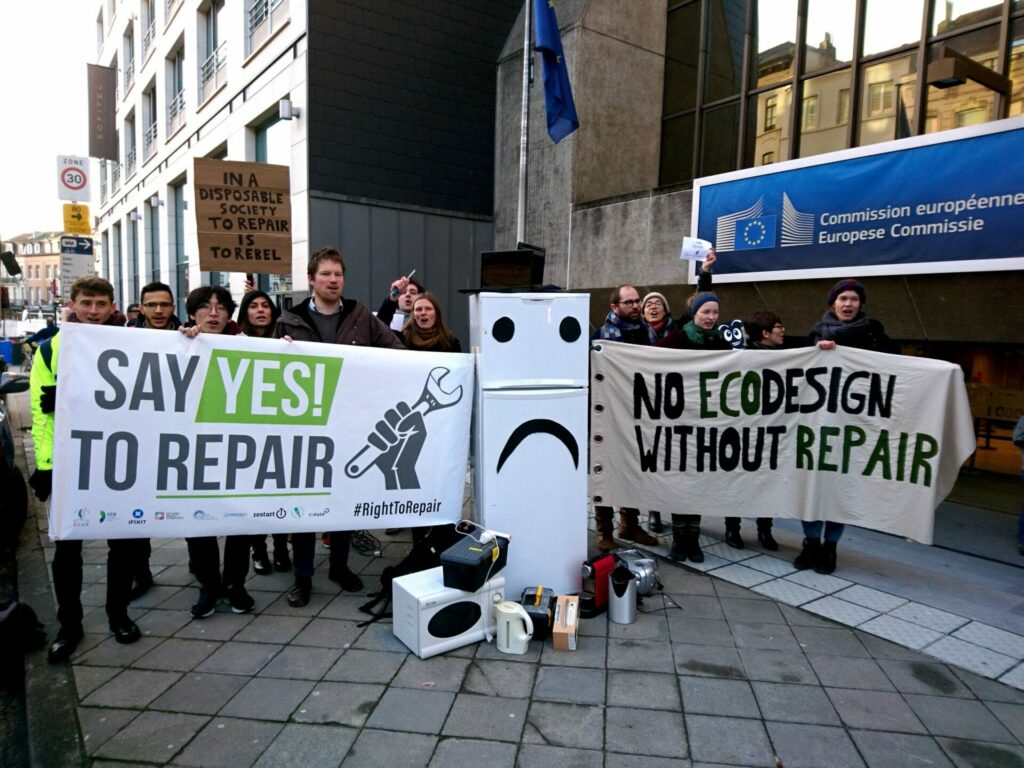The European Commission proposed on Wednesday a policy that will make it easier for people to access reparation services for household appliances and electrical goods. The proposal includes: wider availability of spare parts, reinforced legal guarantees and better consumer contact with repairers.
The measures implement the "right to repair," the concept that if a person owns something and it breaks, it should be possible to have it repaired by a technician of your choice. This may seem straightforward, but it is not always the case for modern tech.
The new rules promise to increase affordability. "We crunched the numbers and even if I take them with caution: over the next 15 years, the repairs could bring total savings to €176 billion, or €25 per consumer per year," declared Didier Reynders, EU commissioner for Justice.
Prioritising product repair instead of replacement is also an essential part of curbing CO2 emissions and creating sustainable communities. Currently, the market for recycling electric waste is underdeveloped. In fact, many European countries illegally export toxic electronic waste to developing countries.
Right to repair
When you purchase an item, you are already entitled to a minimum two-year warranty under EU law. If you buy a smartphone and it turns out to be faulty, you can then request to have it repaired, replaced, or reimbursed. Under the new rules, the seller will have to repair the phone for free, as long as reparation is cheaper or equal in cost to replacement. They will also be required to do it "within a reasonable time and without any inconvenience for the consumer".
Today, if your phone surpasses the legal warranty and becomes faulty, then you are out of options. But with the "right to repair" regulations, producers will be obliged to repair products for up to 5 to 10 years after the purchase (unless repair is impossible). This applies to items like washing machines, vacuum cleaners, dishwashers, or fridges.
The second key element of the measure is the accessibility of spare parts, which the Commission decided should be available even after a product is discontinued, specifically for up to 7 to 10 years after the last item of a series is manufactured.
The "right to repair" rules also includes the creation of national "matchmaking" platforms where consumers can find repairers based on different criteria, including their location. Consumers will also have the right to ask repairers for a price quote and key conditions of repair through a "European Repair Form". Through the form consumers can request clear answers on the price, the duration of the repair or the level of performance the product will have afterwards.
🧐Reasons why people don't #repair their smartphone according to a @bitkom survey:
- Too high repair cost (73%) - Desire for a new device (53%) - Assumption that repair is too complicated (44%) 📢Will the @EU_Commission propose a far-reaching #Righttorepair framework today? https://t.co/Nzye3JOFEK — Right to Repair Europe (@R2REurope) March 22, 2023
Advocates, however, decry the lack of ambition of the proposal, since requiring manufacturers to provide repair services does not automatically make them affordable.
"The commissioner said today that the online repair registries will increase competition and that will drive the prices down, but we don’t think that this will be the case," Cristina Ganapini, the coordinator of the Right to Repair Coalition (R2R) told The Brussels Times. "To drive the price of repairs down, we need to open up the market for repair parts, repair manuals and diagnostic tools to independent repairers - all those that are not in the network of the manufacturer."
Ganapini also notes that the anti-repair practices of producers have not been tackled in the legislation. These production practices often force customers to replace their products or limit how accessible repairs are.
A lot of these practices are included in 'planned obsolescence' tactics, like equipping laptops with irreplaceable batteries that have short life spans, or smart ink cartridges that disable themselves when there is still ink left.
Some products have software protocols that discourage repair: in 2021, the iPhone 13 was released with software that broke the facial identification feature if the phone screen was replaced by a non-Apple repair shop. The company has since reversed the measure.
Related News
- With over 10,300 robots installed, Belgium ranks 15th worldwide
- New IPCC report: A grim and final warning on climate action
- Environment Minister unveils plan to 'combat short life span of electrical goods'
"Failing to grant consumers horizontal and fair access to repair, the Commission is set to keep wasting precious resources in a growing mountain of hazardous e-waste," wrote Ganapini in the R2R reaction to the new measure. "In the current geopolitical context, this is also a missed opportunity to reduce our dependence on critical raw materials and components imported from abroad."
The text will now be sent for approval at the Council of the EU and the European Parliament.

